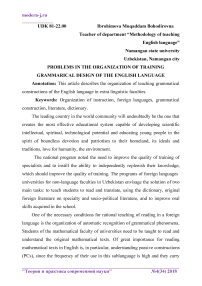Problems in the organization of training grammarical design of the English language
Автор: Ibrohimova M.B.
Журнал: Теория и практика современной науки @modern-j
Рубрика: Основной раздел
Статья в выпуске: 4 (34), 2018 года.
Бесплатный доступ
This article describes the organization of teaching grammatical constructions of the English language in extra linguistic faculties.
Organization of instruction, foreign languages, grammatical construction, literature, dictionary
Короткий адрес: https://sciup.org/140273057
IDR: 140273057
Текст научной статьи Problems in the organization of training grammarical design of the English language
The leading country in the world community will undoubtedly be the one that creates the most effective educational system capable of developing scientific intellectual, spiritual, technological potential and educating young people in the spirit of boundless devotion and patriotism to their homeland, its ideals and traditions, love for humanity, the environment.
The national program noted the need to improve the quality of training of specialists and to instill the ability to independently replenish their knowledge, which should improve the quality of training. The programs of foreign languages universities for non-language faculties in Uzbekistan envisage the solution of two main tasks: to teach students to read and translate, using the dictionary, original foreign literature on specialty and socio-political literature, and to improve oral skills acquired in the school.
One of the necessary conditions for rational teaching of reading in a foreign language is the organization of automatic recognition of grammatical phenomena. Students of the mathematical faculty of universities need to be taught to read and understand the original mathematical texts. Of great importance for reading mathematical texts in English is, in particular, understanding passive constructions (PCs), since the frequency of their use in this sublanguage is high and they carry significant load information.
We carried out a qualitative analysis of the frequency of occurrence of passive constructions of the English language in mathematical texts of English and American authors of monographs and periodicals. The total amount of material analyzed is 10,000 simple sentences. Of these, about 22% of the proposals contain passive designs.
The question of understanding texts containing PCs is especially acute in the Uzbek audience. Because the collateral systems of English and Uzbek languages differ sharply from each other: in English there are two pledges, and in Uzbek there are five, which makes it very difficult to master this grammatical phenomenon. Teachers of Uzbekistan's universities are faced with the question of the most rational way of solving the task at a limited time schedule. According to curricula, a foreign language in Uzbek groups is studied for 1 to 4 hours, and for 2, 3 courses for 2 hours a week.
Philologists and methodologists of Uzbekistan have developed the program, and also created textbooks on foreign languages for secondary schools and universities with Uzbek language of instruction. This markedly increased the level of teaching foreign languages in the republic. However, the successes achieved by schools, linguistic and especially non-linguistic universities in improving the quality of teaching foreign languages, are still clearly insufficient. This is due, above all, to the poorly developed methodology for organizing the teaching of foreign languages in a national audience. There are only a few scientific works devoted to teaching grammatical phenomena of the English language for reading in universities, taking into account the specifics of the Uzbek audience.
Some studies in the field of teaching students of the Uzbeks understanding of grammatical phenomena when reading texts on the specialty conducted. However, none of these works touched upon the issue of learning to understand the PC English. It is not investigated which passive constructions are the most frequent in mathematical texts, what exactly are the difficulties for Uzbek students in understanding this grammatical phenomenon, there are no rational ways of presenting the PC of English language, nomenclature and sequence of exercises for their mastering.
In practice, in the textbooks of non-lingual universities of Uzbekistan, students are encouraged to study all PCs, regardless of their frequency in the English language in general and in scientific texts in particular. Exercises for learning the studied PCs are not aimed at a certain type of speech activity. Most of them are either a translation from Uzbek into English, or formal transformations from an active form into passive vocabulary. These exercises do not provide the formation of receptive reading skills, which are the main goal of teaching foreign languages in a non-linguistic institution.
As the results of the cuts conducted after studying the theme "Passive" on the current textbook show, the acquisition of the PC of the English language is carried out on average by 32-69%, i.е. students do not reach the level of training. The foregoing gives grounds to conclude that the methodology for organizing training in the understanding of the English language PC by Uzbek students when reading mathematical texts has not been developed, and this causes the creation of effective methods of teaching passive constructions of the English language.
Список литературы Problems in the organization of training grammarical design of the English language
- Дорожника В.П. Английский язык для студентов-математиков. -М. 2004.
- С.А.Шаншиева. Английский язык для студентов-математиков М.1991.
- Cohen, A.D. 1998. Strategies in Learning and Using a Second Language. London: Longman.
- Н.И. Шахова и др. "Learn to read science". "Наука", 1980.


